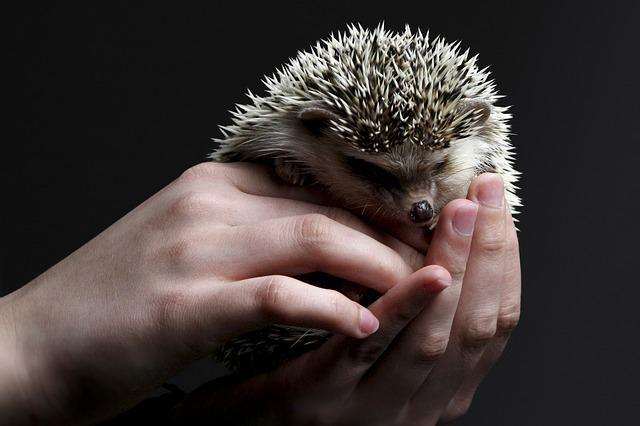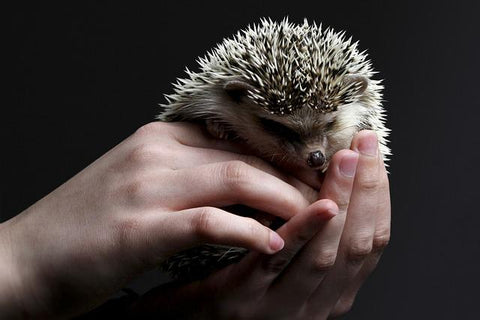Hedgehog Ownership: Breed Information, Care Items, and Facts | NextGenPaws

Hedgehogs are often thought of as pests, but they can make excellent pets! While they are not nearly as common as dogs or cats, hedgehogs have become increasingly popular in recent years. These cute and spiky creatures are relatively low-maintenance, and they make great companions for people of all ages.
If you're thinking about adding a hedgehog to your family, there are a few things you should know first. In this article, we'll cover everything you need to know about hedgehog ownership, including breed information, care items, and some fun facts.

Are hedgehogs good pets?
Hedgehogs can make great pets, but they may not be right for everyone. If you're considering adding a hedgehog to your family, please do your research to ensure that you're prepared to take on the responsibility.
Hedgehogs are nocturnal animals, which means they are most active at night. This can make them a bit challenging to care for, as they may not be able to adjust to your schedule.
Although the average hedgehog lifespan is also 4-5 years, with proper care, hedgehogs can live for 5-10 years. However, many hedgehogs do not live this long due to poor diet and lack of exercise. Regardless, you'll need to be prepared for a long-term commitment.
By providing your hedgehog with a healthy diet and plenty of enrichment, you can help them live a long and happy life.
In addition, hedgehogs can be skittish and may not enjoy being held or cuddled. You may also need to provide extra care when it comes to their diet and housing. If you're not prepared to take on these challenges, a hedgehog may not be the right pet for you.
Do hedgehogs require any special care?
Hedgehogs require relatively little care, but there are a few things you'll need to do to keep them healthy and happy. First, you'll need to provide them with a balanced diet that fits their omnivorous nature. You should also give them access to fresh water at all times.
Hedgehogs also require regular exercise, so it's important to provide them with plenty of space to run and play. A wheel is a great way to help your hedgehog get the exercise they need.
Finally, you'll need to clean their cage regularly to prevent disease and keep them comfortable.
What do hedgehogs eat?
Hedgehogs are omnivores, which means they can eat both plants and animals. In the wild, their diet consists of insects, slugs, earthworms, and other small creatures. They also eat fruits, vegetables, and nuts.
This diet should be replicated with your pet hedgehog to give them the requisite proteins and nutrients. Insects should make up the majority of their diet, but they should also have access to fresh fruits and vegetables. You can purchase commercially-prepared hedgehog food at most pet stores, or you can make your own.

How to take care of a hedgehog for beginners
Thinking of adopting a hedgehog for your your home. Here is a step by step guide to help you adopt and take care of a hedgehog pet.
Choose a species
First off you need to be sure of the species of hedgehog you want to take care of. There are four species of hedgehogs that are popular as pets. These include the Algerian hedgehog, the European hedgehog, the African pygmy hedgehog, and the Chinese long-toed hedgehog. The African pygmy hedgehog is the most popular of these species. All of these species have different care needs.
Find out the extant hedgehog laws where you live
Secondly you need to know whether it is legal to own a hedgehog where you live. Avoid hedgehog pet illegal states such as California, Georgia, Hawaii, Pennsylvania and Wyoming. It is also important to check with your city or county laws as some places have additional bans or restrictions on hedgehogs.
Find a reputable breeder or adopt a hedgehog
Once you have checked that it is legal for you to own a hedgehog where you live, you need to find a reputable breeder or adopt from a hedgehog rescue. Never buy a hedgehog from a pet store as they often get their animals from puppy mills or other sources that do not breed healthy animals.
Know how to choose a hedgehog
When choosing a hedgehog, it is important to select one that is friendly and used to being handled. It is also important to choose a hedgehog that is the right size for you. African pygmy hedgehogs typically weigh between 2 and 3 pounds as adults while Chinese long-toed hedgehogs can reach up to 5 pounds.
Create your hedgehog housing
Once you have chosen your hedgehog, you need to prepare their home. Hedgehogs require a spacious and well-ventilated cage. The minimum size for a hedgehog cage is 24" x 24" x 36", but larger is always better.
You should also choose the right substrate for your hedgehog's cage. This is the material that you will use to line the bottom of their enclosure. The best substrates for hedgehogs are aspen shavings, paper towels, or grass hay. Avoid using cedar shavings as they can be harmful to your hedgehog if inhaled.
Many often ask what do hedgehogs need in their cage? Well, your hedgehog's cage should also include a hiding place. This is because they like to have a safe space to retreat to when they're feeling stressed. Hedgehogs are also escape artists, so it's important to choose a cage with a secure lid. You may also want to consider adding a wire mesh top to the cage to prevent your hedgehog from escaping.
Keep your hedgehog alone in the cage.
Hedgehogs are solitary animals and do not do well when housed with other hedgehogs. In fact, housing multiple hedgehogs together can lead to fighting, which can cause serious injuries.
If you're considering getting more than one hedgehog, it's important to get them from the same litter so that they're more likely to get along.
Keep the cage clean
Hedgehogs are very clean animals and do not like to live in dirty environments. As such, it's important to keep their cage clean. This means spot-cleaning their cage daily and doing a complete cleaning once a week.
When cleaning your hedgehog's cage, be sure to remove all of the bedding and wash all of the toys and accessories in hot soapy water. The cage itself should be cleaned with a mild disinfectant.
Provide fresh water
Your hedgehog will also need access to fresh water at all times. The best way to provide this is by using a small water bottle that attaches to the side of their cage. Be sure to clean and refill the water bottle daily.
Give your hedgehog a bath
Hedgehogs typically do not need to be bathed, but you may want to give them a quick sponge bath every few weeks. When bathing your hedgehog, be sure to use warm water and a gentle soap. Avoid getting water in their nose or ears and be sure to rinse them off thoroughly.
After their bath, you can towel-dry your hedgehog or place them in a warm, dry environment until they are completely dry.
Feed your hedgehog a healthy diet
Hedgehogs are omnivores, which means that they require both plants and meat in their diet. A good diet for a hedgehog includes fresh vegetables, fruits, cooked meat, and a small amount of insects.
It's important to avoid feeding your hedgehog processed foods, as these can be high in sugar and fat. You should also avoid giving them nuts and seeds, as these can be difficult for them to digest.
Provide enrichment
Enrichment is anything that you can use to keep your hedgehog's mind active and stimulated. This can include toys, wheels, tunnels, and even foraging for food.
By providing enrichment for your hedgehog, you can help prevent boredom and encourage healthy behaviors.
Be prepared for quills
Hedgehogs are covered in sharp quills that they use for self-defense. These quills are not poisonous and will not come out easily.
If you are poked by a hedgehog quill, it can be quite painful. However, the quill will eventually fall out on its own.
If you are concerned about being poked by your hedgehog's quills, you can trim them down using a pair of scissors. Just be sure to avoid cutting the quills too short, as this can cause discomfort for your hedgehog.
Provide them a dark, quiet place to sleep during the day
Because hedgehogs are nocturnal animals they like to sleep in their nests or hide away in their hiding places. This is why it's important to provide your hedgehog with a dark, quiet place to sleep during the day.
Be patient
Hedgehogs are not typically friendly animals and can be quite shy. It may take some time for your hedgehog to get used to you and feel comfortable around you.
The best way to bond with your hedgehog is to handle them regularly and offer them treats. With time and patience, you will eventually be able to form a close bond with your hedgehog.
How to take care of a hedgehog in your garden
Do not use pesticides in your garden if you have a hedgehog living there. Pesticides can be harmful to hedgehogs and other wildlife. Try using natural methods to deter pests such as planting marigolds or using coffee grounds. You should also provide a water bowl and some shelter for your hedgehog.

What are the signs of a healthy hedgehog?
A healthy hedgehog has bright eyes, clean ears, and smooth quills. They should also be active and alert. Hedgehogs are susceptible to a number of health problems, such as respiratory infections, mites, and eye infections.
They can also be born with genetic defects that can cause health problems later in life. It's important to take your hedgehog to the vet regularly for check-ups to help prevent these problems.
Are hedgehogs easy to take care of?
In summary, Hedgehogs can make great pets for the right person. They are relatively low-maintenance and can provide you with years of companionship. Just be sure to do your research and be prepared for their unique care needs.
Best Sellers

WATERCOLOUR

THE YOUNG QUEEN

MINIMALIST DESIGN

MINIMALIST PET PORTRAIT

THE GENERAL

THE ICE QUEEN

THE ROYAL COUPLE

THE CONVICT

THE PRESIDENT

THE BOURGEOIS COUPLE

WATERCOLOUR SIBLING



